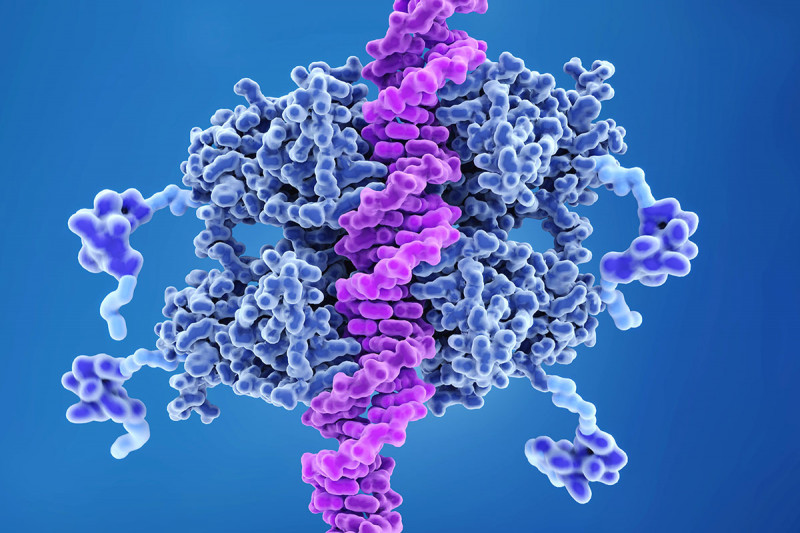
More than 50% of all cancers contain a mutation in the p53 gene. The protein made from this gene is critical for ridding the body of cells that have developed genetic mistakes that could lead to cancer. When it stops working, precancerous cells can slip by and a tumor may develop.
Scientists have known about the p53 protein — dubbed the “guardian of the genome” — since the 1970s. It is one of the most investigated molecules ever, the subject of more than 80,000 research papers. But despite the attention, much remains to be understood about how p53 carries out its tumor-suppressing function.
In a paper published September 18 in the journal Nature, a team of scientists from the Sloan Kettering Institute reports they have discovered a previously unrecognized way that p53 works to prevent cancer: by altering cell metabolism in a way that affects a cell’s identity.
Metabolism refers to the collection of chemical reactions that cells use to survive and grow. In recent years, scientists have learned that the chemicals involved in metabolism also influence what genes are turned on or off in a cell, and in that way alter its identity. They can now add p53 to this picture.
“What we found is that if you reestablish working p53 in a tumor that lost it, the tumor doesn’t go away, but it reverts to a precancerous state,” says Scott Lowe, Chair of the Cancer Biology and Genetics Program in SKI and one of the study’s two corresponding authors. “And the way that it does this is by remodeling metabolism.”
The researchers made their discoveries in a mouse model of pancreatic cancer. Loss of p53 function is known to be an early event in the development of that disease.
A Wider Role for Metabolism in Cancer
The central player in the process is a molecule called alpha-ketoglutarate, part of a cell’s energy-harvesting cycle. The investigators found that p53 increases a cell’s supply of alpha-ketoglutarate. As a result, different genes are turned on in the cell, which thwarts the cell’s ability to become cancerous.
There were previous hints that alpha-ketoglutarate could play a role in cancer. Several years ago, researchers at MSK and elsewhere discovered that mutations in two metabolism-related genes, IDH1 and IDH2, promote cancer by altering alpha-ketoglutarate metabolism. But IDH1/2 mutations account for only a very small fraction of human cancers. Some scientists suspected that alpha-ketoglutarate’s role in cancer was rare.
Now that p53 has been found to work, in part, through alpha-ketoglutarate, scientists can no longer think of it as an isolated case.
“By linking p53 to this process, it says that this whole metabolic program is undoubtedly important in many cancers, not just those that have IDH mutations,” Dr. Lowe explains.
Paired Expertise
Lydia Finley, a cell biologist in SKI and the paper’s other corresponding author, notes that the new findings were made possible by a unique collaboration between scientific labs with complementary expertise.
“Our lab is interested in how metabolism changes when cells are making fate decisions and whether metabolism can actually affect those decisions,” she says. “Scott Lowe’s lab has amazing techniques to study cell fate decisions in the context of cancer, so this study was a perfect way to combine our expertise in a way that hadn’t been done before.”
The team used a technique called RNA interference to selectively silence and restore p53 function in cells. When they did this, they saw a pattern of gene expression that looked a lot like that of precancerous cells. This implied that the cancer cells had essentially “gone back in time,” she says, to a less chaotic, more differentiated state.
What’s more, the scientists could mimic the effect of having a functional p53 protein simply by giving the cell more alpha-ketoglutarate. This finding has hugely important therapeutic possibilities.
“Historically, it hasn’t really been possible to think of ways to exploit a p53 mutation to help patients,” Dr. Lowe says. “The fact that we can regulate this metabolic program independently of p53 points toward potential treatment strategies.”
He cautions that this possibility hasn’t been proven and much more work needs to be done to establish whether it is a viable approach. Nevertheless, the findings are likely to excite researchers in the field.
Remaining Questions
The scientists do not yet know exactly how alpha-ketoglutarate alters gene expression. It could have to do with modifying chromatin, the coiled combination of DNA and histone proteins.
“We know alpha-ketoglutarate is required for the function of a large family of chromatin-modifying enzymes that change gene expression and shape cell identity,” says Jossie Yashinskie, a graduate student in the Finley lab and the paper’s co-first author.
“It’s very important to point out that alpha-ketoglutarate is not responsible for everything that p53 does,” adds John Morris, a postdoctoral fellow in the Lowe lab and the paper’s other co-first author. “This protein plays numerous other roles that aren’t tied to cell fate decisions.”
A Decades-Long Quest
Dr. Lowe has worked on p53 since the early 1990s. Back then, he showed that the effectiveness of radiation and chemotherapy depended in large part on p53, which triggers cell death in response to the DNA damage caused by these agents.
Reflecting on the latest findings, he says it feels satisfying to connect more of the dots: “This is by all accounts the most important molecule in cancer. We’ve known about it for 30 years and haven’t totally figured out what it does and why it’s so critical. This is a major advance in that understanding.”

